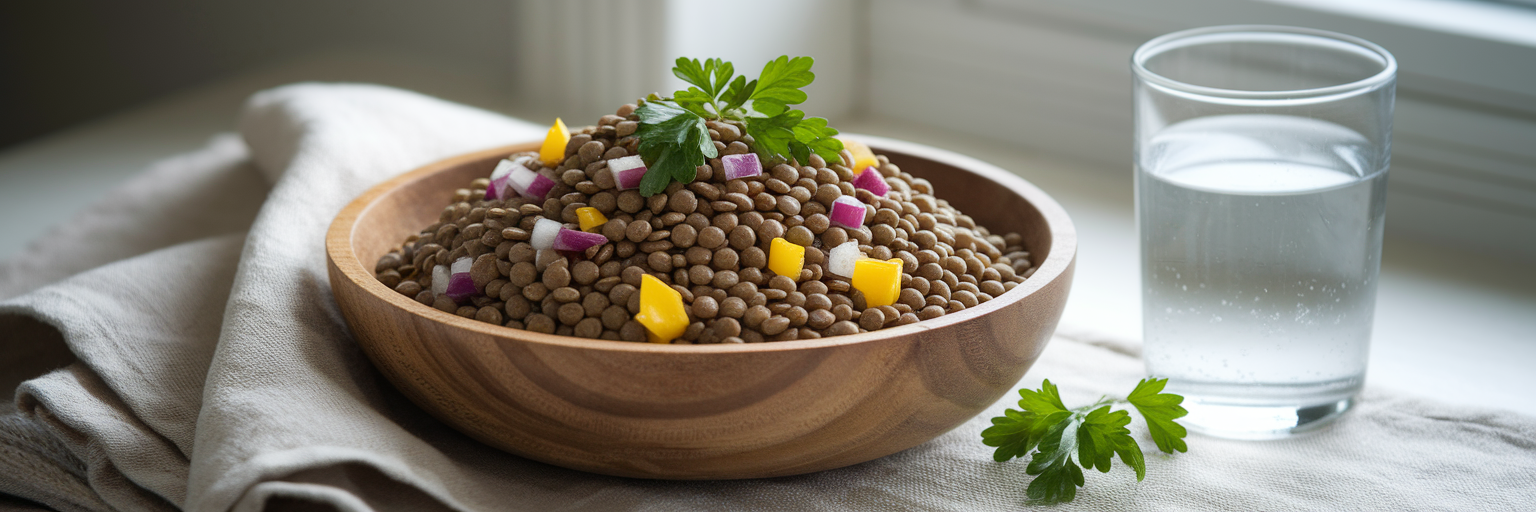The Connection Between Diet and Conception
In the United States, about 1 in 5 women aged 15 to 49 with no prior births have difficulty getting pregnant after one year of trying. While many factors contribute to fertility, nutrition provides a powerful and proactive foundation for conception. A nutrient-dense diet supplies the essential building blocks for reproductive hormones like estrogen and progesterone, supports healthy ovulation, and helps prepare the uterine lining for implantation. It is about creating a supportive nutritional environment for your body.
One of the key concepts here is oxidative stress, a cellular imbalance that can damage both egg and sperm quality. Specific nutrients, especially antioxidants, act as protectors at this microscopic level. Think of your diet not as a quick fix, but as a consistent way to nurture your reproductive health from the inside out. Understanding this connection is the first step in any fertility journey. For a deeper look into this relationship, you can explore our guide on how diet affects your menstrual cycle.
| Nutrient | Role in Fertility | Common Food Sources |
|---|---|---|
| Folate (Vitamin B9) | Supports cell division, prevents neural tube defects, improves implantation rates. | Lentils, dark leafy greens, asparagus, broccoli. |
| Omega-3 Fatty Acids | Regulate hormones, increase blood flow to reproductive organs, reduce inflammation. | Fatty fish (salmon, mackerel), walnuts, flaxseeds. |
| Antioxidants (Vitamins C, E, Lycopene) | Protect egg and sperm DNA from oxidative stress and cellular damage. | Citrus fruits, berries, leafy greens, cooked tomatoes. |
| Iron | Essential for ovulation and healthy egg development; prevents anemia. | Lentils, spinach, red meat, pumpkin seeds. |
| Zinc | Crucial for egg maturation and fertilization; supports sperm quality. | Oysters, beef, pumpkin seeds, chickpeas. |
1. Fatty Fish for Hormonal Balance
When considering the best foods to boost fertility, fatty fish like salmon stands out. It delivers a powerful combination of omega-3 fatty acids, vitamin D, and selenium. Omega-3s are critical for regulating reproductive hormones and reducing inflammation throughout the body, which can otherwise interfere with conception. They also improve blood flow to the reproductive organs.
At the same time, vitamin D plays a significant role in fertility outcomes, while selenium acts as a potent antioxidant, shielding eggs from free radical damage. To get these benefits, aim for two servings of low-mercury fatty fish per week. Choosing wild-caught salmon over farmed varieties can help minimize exposure to potential contaminants like PCBs. This simple dietary addition is a cornerstone of any effective fertility diet for women and men alike.
2. Lentils for Essential Folate
Lentils are a true plant-based powerhouse, particularly for their high concentration of folate, also known as vitamin B9. For anyone trying to conceive, adequate folate intake is non-negotiable. It is absolutely critical for healthy cell division and has been shown to reduce the risk of neural tube defects in a developing fetus. Research also links higher folate levels to better implantation rates.
Beyond folate, lentils contain beneficial polyamines like spermidine, which aid in the fertilization process and support early cellular growth. Incorporating this versatile legume into your diet is simple. Consider these easy swaps:
- Substitute lentils for ground meat in tacos or bolognese sauce.
- Add a cup of cooked lentils to hearty soups and stews.
- Use them as a protein-rich base for a satisfying lunch salad.
These small changes can make a significant impact on your nutritional intake.
3. Dark Leafy Greens to Fight Oxidative Stress
Building on the idea of protecting your cells, dark leafy greens like spinach, kale, and Swiss chard are champions at combating oxidative stress. They are packed with antioxidants, including vitamins C and E, which neutralize the free radicals that can damage the DNA of both eggs and sperm. This protective action is a key component of natural ways to improve fertility.
A lesser-known benefit of these greens is their potential to improve cervical mucus quality, a factor essential for helping sperm travel to the egg. They also provide the necessary nutrients for healthy cell division after conception occurs. Adding them to your daily routine is easy. Blend a handful of spinach into your morning smoothie or use kale as a base for your salads. Tracking these dietary improvements alongside your cycle with a tool like our fertility calculator with calendar can provide a comprehensive view of your health.
4. Walnuts for Sperm Health
While many foods benefit both partners, walnuts have a unique and well-documented advantage for male fertility. As highlighted in research from institutions like UCLA Health, regular consumption of walnuts can significantly improve key sperm parameters. This makes them one of the best foods to boost fertility, especially when a couple is trying to conceive together.
What do these parameters mean? They refer to sperm vitality (its overall health), motility (its ability to move effectively), and morphology (its correct shape). All three are critical for a sperm’s journey to successfully fertilize an egg. The recommendation is refreshingly simple: eating just a handful of walnuts each day can make a difference. They can be enjoyed as a standalone snack or easily added to oatmeal, yogurt, or salads for a daily fertility boosting crunch.
5. Cooked Tomatoes for a Lycopene Boost
Tomatoes are a fantastic source of lycopene, a powerful antioxidant that contributes to a healthy fertility diet for women and men. However, the most important insight here is about bioavailability. Your body can absorb significantly more lycopene from cooked tomatoes than from raw ones. This means that tomato sauce, paste, and soup are more potent sources for reaping these benefits.
Lycopene has been specifically studied for its positive effects on male fertility, where it has been shown to help improve sperm concentration and motility. To maximize your intake, consider making a homemade marinara sauce from tomato paste, enjoying a warm bowl of tomato soup, or adding sun-dried tomatoes to your dishes. These simple culinary choices are effective foods that help you get pregnant by supporting sperm health from a nutritional standpoint.
6. Citrus Fruits for Egg and Sperm Protection
Citrus fruits like oranges, grapefruits, and lemons are celebrated for their high vitamin C content. This essential nutrient plays a dual role in fertility by protecting the DNA in both egg and sperm cells from oxidative damage. By safeguarding this genetic material, vitamin C helps ensure the best possible start for a potential pregnancy.
Like the lentils we discussed earlier, citrus fruits also provide beneficial polyamines that are important for reproductive health. This shows how different whole foods can work together to support the same biological goals. Incorporating these fruits into your diet is straightforward. Start your day by adding a squeeze of lemon to your water or enjoy a small orange as a snack. If you experience cycle irregularities, ensuring your body has these key nutrients is vital. You can learn more about what causes an irregular menstrual cycle on our platform.
7. Full-Fat Dairy for Ovulation Support
The conversation around dairy and fertility often includes a surprising recommendation: choose full-fat options. The healthy fats found in products like whole milk, full-fat yogurt, and cheese are important precursors for hormone production. A diet that includes these fats can help support regular ovulation, a cornerstone of fertility.
This approach contrasts with the conventional wisdom that often promotes low-fat products. In fact, some studies suggest that for women experiencing ovulatory infertility, low-fat dairy may not be as beneficial. This does not mean it is a rule for everyone, but it presents a potential switch to consider if you are trying to conceive. Simple swaps include choosing full-fat Greek yogurt over non-fat versions or using whole milk in your coffee. This is one of the most discussed topics when looking for the 7 best foods to increase fertility.
Creating Your Fertility-Friendly Diet
Ultimately, building a diet to support your fertility is about inclusion and abundance, not about harsh restrictions. The goal is to fill your plate with a variety of nutrient-dense whole foods. The foods that help you get pregnant are those that nourish your entire body, creating an optimal environment for conception. Remember that diet is just one piece of a larger puzzle. A holistic approach also includes:
- Maintaining a healthy weight for your body
- Finding effective ways to manage stress
- Engaging in regular, moderate exercise
- Limiting alcohol and caffeine intake
Viewing these changes as positive, empowering steps can make the journey feel more manageable. Always consult with your healthcare provider for personalized advice tailored to your specific needs. As you plan, using a tool like our conception calculator to find your conception date can be a valuable resource.




